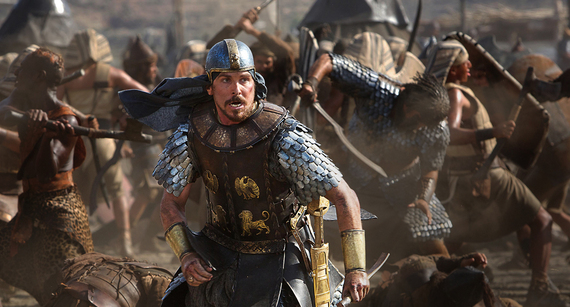Exodus: Gods and Kings is an engaging film. While Christian Bale is no Charleton Heston, he brings a vivid Moses to life. You feel part of the experience as the Israelites run from Pharaoh and the sea splits.
Yet, perhaps what makes Exodus an engaging film also makes it a dangerous one. The drama becomes secondary to the lesson. War prevails over wisdom. The sensational replaces the scholarly. (i.e. Moses never flings a sword into the sea in order to split it.) Without knowing more about the story, a viewer could agree with Christian Bale's statement that Moses could be considered a terrorist.
Yet, Jews never looked at Moses purely on the surface. We do not remember him as a warrior. We remember him as Moshe Rabenu, Moses our teacher. We remember him as Moses the Humble. We remember him as Moses the servant of God.
What You Remember is More Important than What Happened
Knowing these ways of remembering is essential because memory matters more than history. History lives in the past. Memory shapes the present and future. History is what happened. Memory is how we make sense of what happened.
When it comes to Moses, we have very little history. Scholars cannot say for certain what Moses did and whether he even existed. The Bible is the only record we have of the Exodus story, and it is not a historical book. It is a religious one
What the Bible teaches us, however, is that Moses matters deeply. He matters because of the way we remember him. And the Exodus film remembers him as a passionate warrior. Our tradition remembers him as a teacher of justice and righteousness.
How We Need to Remember Moses
The best example of the power of memory and the way we remember Moses is found in an essay by the late Zionist writer Ahad Ha'am. The essay looks at the Moses's first actions as adult. Each of the incidents Ha'am examines are also highlighted in the film.
The first happens when Moses leaves Pharaoh's palace. He sees an Egyptian beating an Israelite slave, and Moses defends the slave and kills the Egyptian. The next day, he sees two Israelites fighting, and he intervenes and rebukes the instigator. Then, after Pharaoh finds out Moses killed an Egyptian slave master, he orders that Moses be killed.
Moses escapes to the wilderness of Midian. Right when he gets there, he sees seven Midianite women, seeking water for their father's flock, being driven away from a well of water by Midianite shepherds. What does Moses do? He intervenes on behalf of the Midianite women, drives the shepherds away and waters the women's flock.
In all three instances, as Ha'am points out, Moses intervenes on the side of justice. He intervenes with passion and with anger, with a readiness to care, to suffer, and above all, to act. It does not matter whether an Israelite is involved or not. In any case, Moses acts for justice.
That is the Moses we need to remember. That is the Moses this film misses. Click here to discover 10 other things you need to know before seeing the Exodus movie
